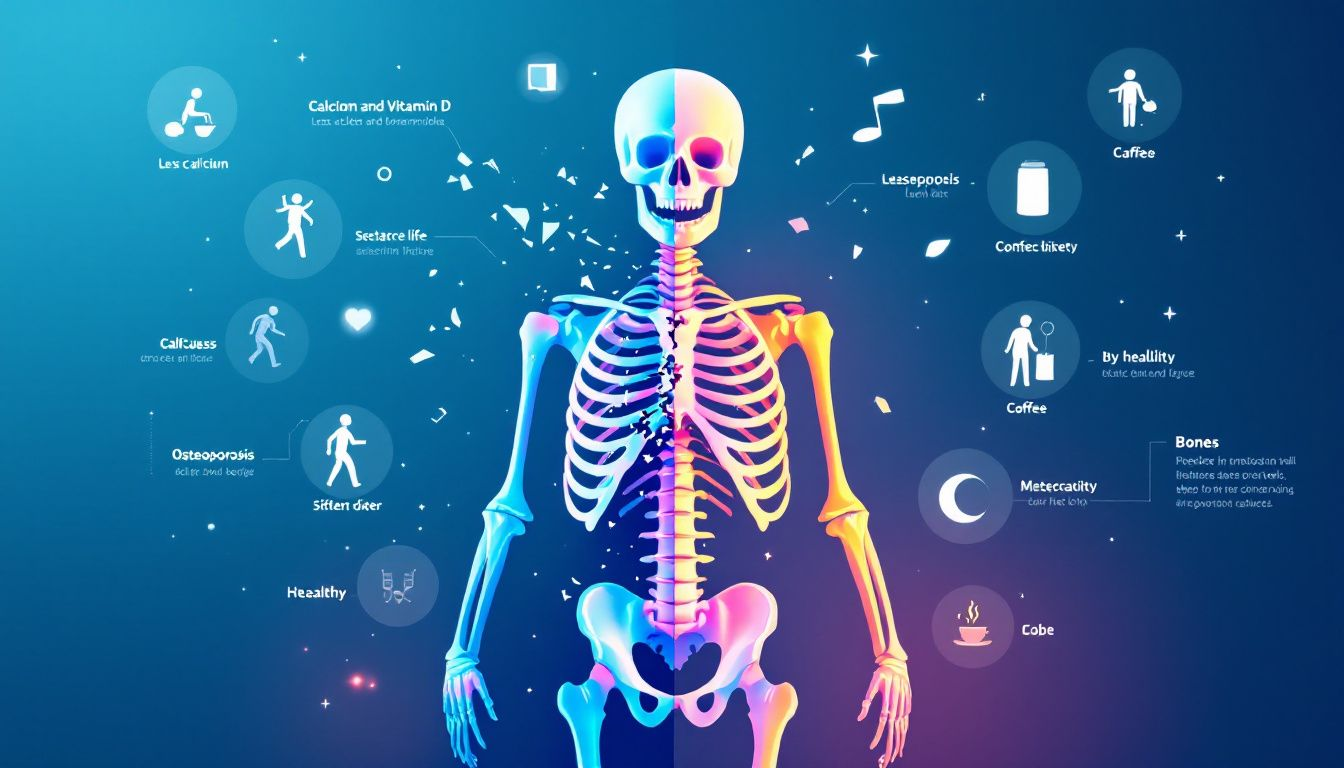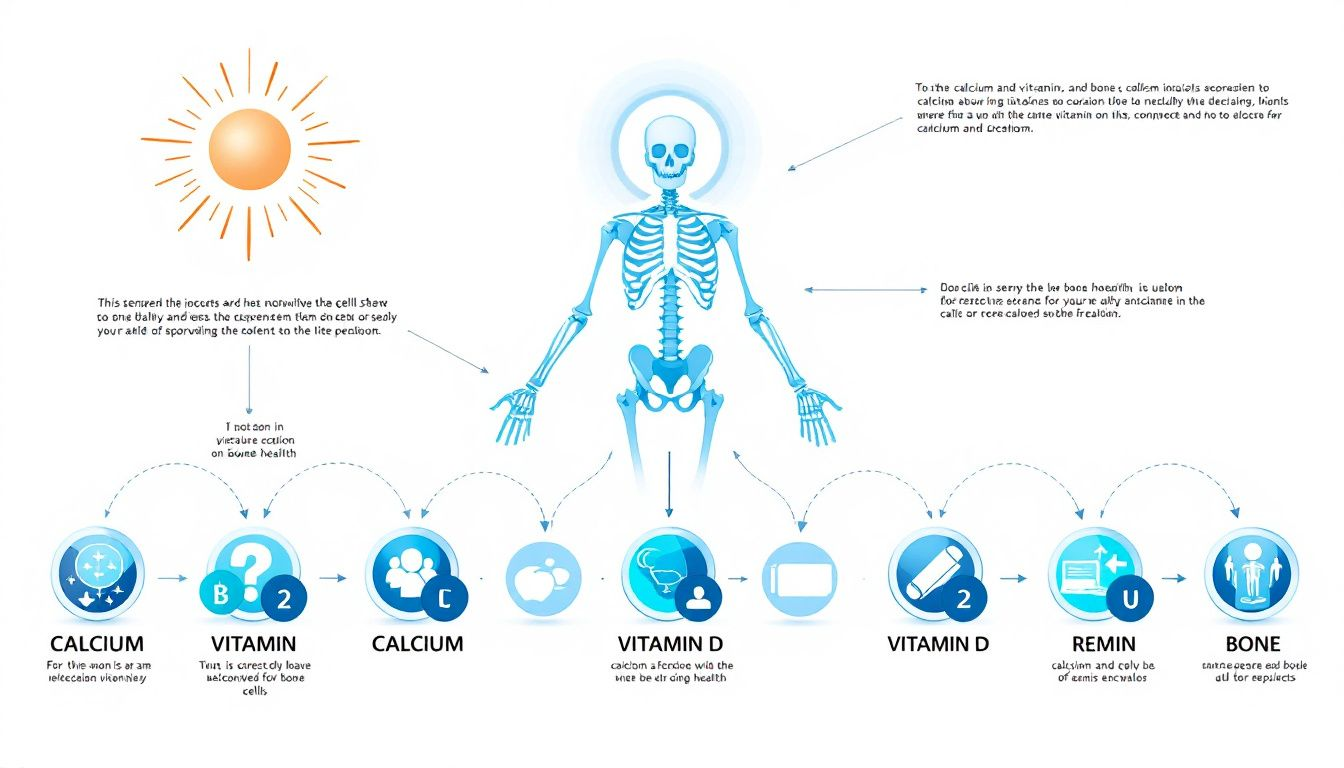Osteoporosis affects millions worldwide, particularly postmenopausal women, by silently weakening bone tissue and increasing the risk of fractures. Low bone density and bone loss pose significant health concerns, so adequate calcium intake and vitamin D are more critical than ever. These essential nutrients play a vital role in bone health by improving calcium absorption, strengthening bone mineral density, and reducing fracture risk. Meeting these requirements solely through diet may not be feasible for many, making calcium and vitamin D supplements essential to managing and preventing osteoporosis.
This guide explores the best supplement for osteoporosis and provides expert advice on selecting the proper calcium supplementation, such as calcium citrate for those with low stomach acid. You’ll also discover how pairing calcium and vitamin D enhances bone growth and prevents further bone loss. Beyond supplements, we’ll highlight the importance of a diet rich in calcium-rich foods, a healthy lifestyle, and regular weight-bearing exercises. Whether you aim to prevent osteoporosis or manage its progression, this article comprehensively looks at maintaining healthy bones and supporting healthy aging. Let’s dive in!
Key Takeaways
- Osteoporosis poses serious health risks, especially for postmenopausal women, making adequate calcium and vitamin D intake essential for prevention and management.
- Calcium supplements may be necessary for those unable to meet dietary requirements, with calcium citrate preferable for individuals with lower stomach acid.
- Combining calcium and vitamin D enhances bone health, and a holistic approach, including a nutrient-rich diet and regular exercise, is vital for managing osteoporosis.
Understanding Osteoporosis

Osteoporosis is a major public health concern causing significant morbidity and mortality globally. Its long-term effects include pain, loss of independence, and potential institutionalized care. Postmenopausal women, especially those who are white and Asian, are at the highest risk. Adequate calcium and vitamin D intake are fundamental in treating osteoporosis and maintaining bone health.
Recognizing osteoporosis and the significance of bone health is crucial in combating this condition. The National Osteoporosis Foundation underscores the importance of a healthy diet, regular exercise, and proper supplementation for maintaining strong bones.
Getting sufficient calcium and vitamin D helps prevent further bone loss and maintain bone mineral density.
What is Osteoporosis?
Osteoporosis is a condition marked by low bone mass and an increased risk of fractures. This fragility results from decreased bone density, making bones more susceptible to breaks. Over 10 million Americans over the age of 50 suffer from osteoporosis, with one out of every two women in this age group experiencing an osteoporosis-related fracture. The financial burden is substantial, with annual costs for osteoporotic fractures in the US estimated to range from $12.2 to $17.9 billion.
This condition can significantly impact the quality of life, leading to chronic pain and increased dependence on others as it progresses. Effective management and prevention strategies are essential.
Importance of Bone Health
Maintaining bone health prevents osteoporosis and ensures overall well-being. Calcium and vitamin D are vital for building strong, dense bones. A nutrient-rich diet supports bone health and significantly reduces fracture risk. Research shows that combined calcium and vitamin D supplementation can lower the risk of total fractures by 15% and hip fractures by 30% among the elderly.
Aging naturally decreases bone density, making calcium intake and overall bone health even more important. A balanced diet with sufficient calcium, vitamin D, and other essential nutrients supports bone health, enhances bone mineral density, and reduces fracture risk.
The Role of Calcium in Osteoporosis Management

Calcium is essential for:
- Building and protecting bones
- Blood clotting
- Muscle contraction
- Heart function
About 99% of the body’s calcium is stored in bones and teeth, which is crucial for their structural integrity. Adequate calcium intake maintains strong bones and prevents osteoporosis. Insufficient calcium intake leads to calcium being taken from bones, resulting in weaker bones and increased fracture risk.
The National Osteoporosis Foundation recommends adequate calcium and vitamin D intake for optimal osteoporosis care. Unfortunately, many people do not get enough dietary calcium, making supplementation necessary for many.
Dietary Calcium Sources
The best way to obtain calcium is through diet, which is preferred over supplements. Familiar sources include dairy products, orange juice, cereals, and plant-based milk substitutes. Dairy products provide about 300 milligrams of calcium per serving. Leafy greens and fortified foods also offer substantial amounts of calcium.
Checking the nutrition facts panel for calcium's daily value (DV) helps determine its food content. Incorporating calcium-rich foods into the diet is an effective way to enhance bone health and prevent osteoporosis.
Calcium Supplements
Supplements can be valuable for those who struggle to get enough calcium from their diet. Calcium supplements mainly come as calcium carbonate and calcium citrate. Calcium carbonate contains 40% elemental calcium but requires stomach acid for optimal absorption. Calcium citrate is better absorbed without food, making it suitable for individuals with lower stomach acid.
Calcium supplements come in various forms, such as tablets, capsules, chews, liquids, and powders. Consider the serving size on the label when assessing calcium content. Take calcium supplements with meals and in doses four to five hours apart for optimal absorption.
Absorption Factors
Vitamin D is necessary for effective calcium absorption. Incorporating dairy products, leafy greens, and fortified foods helps meet calcium and vitamin D needs. Taking calcium in smaller doses throughout the day enhances absorption. Avoid oxalate- or phytate-rich foods when taking calcium supplements to ensure better absorption.
Take calcium supplements of 500 mg or less at mealtimes for optimal absorption. Taking calcium carbonate with food enhances intestinal calcium absorption. Spread calcium intake throughout the day for better absorption.
Choosing the Right Calcium Supplement
Before taking calcium supplements, understand individual calcium needs, benefits, and risks. Consider factors like tolerability, convenience, cost, and availability when selecting a supplement. Different forms, including tablets, capsules, and liquids, offer personalized choices.
Comparison shopping can help find the best deals on calcium supplements if cost is a concern. Understanding these factors guides us in choosing the right supplement to support bone health effectively.
Calcium Carbonate vs. Calcium Citrate
Calcium carbonate and calcium citrate are common calcium supplements. Calcium carbonate needs stomach acid for optimal absorption, making it less suitable for individuals with lower stomach acid. Calcium citrate is better absorbed without food and is often recommended for those with lower stomach acid.
Ultimately, choosing between calcium citrate and calcium carbonate depends on individual absorption capabilities and dietary habits. Understanding these differences helps make an informed decision on the best supplement.
Dosage Recommendations
The upper limit for calcium intake for adults aged 19 to 50 is 2,500 mg daily. Older postmenopausal women can reduce bone loss by increasing their daily calcium intake from 400 to 800 mg.
Potential Risks
Calcium supplements may have adverse effects, including an increased risk of cardiovascular events. Excessive calcium intake does not offer additional bone health benefits and can lead to adverse effects.
Consult a doctor or pharmacist about potential interactions before starting calcium supplements.
The Vital Role of Vitamin D

Vitamin D is crucial for absorbing dietary calcium and strengthening bone structure. Adequate levels of calcium and vitamin D maintain bone density and prevent osteoporosis. Research shows calcium and vitamin D help prevent bone loss and reduce fractures.
Dietary sources of vitamin D include fatty fish, egg yolks, and fortified foods. Sun exposure also provides vitamin D. Adequate intake is crucial for maintaining strong bones and preventing osteoporosis.
Sources of Vitamin D
Sunlight helps the body produce vitamin D, and factors such as time of day, season, latitude, skin pigmentation, and age influence its production. Canned salmon with bones, egg yolks, and fatty fish like trout and mackerel are significant dietary sources of vitamin D.
Fortified foods, such as milk and certain cereals, are primary sources of vitamin D in many diets. Incorporating these sources helps ensure adequate vitamin D levels.
Vitamin D Supplements
Individuals with vitamin D insufficiency are at a higher risk of developing conditions like osteomalacia, which weakens bones. Vitamin D deficiency can lead to osteomalacia and osteoporosis in adults if not corrected. Supplements are recommended for those who struggle to get enough from sunlight and dietary sources.
The two types of vitamin D supplements are Vitamin D2 (ergocalciferol) and Vitamin D3 (cholecalciferol). People with osteoporosis should discuss their vitamin D levels with a healthcare provider.
Recommended Intake
A healthy 25-hydroxy vitamin D level is generally agreed to be between 30-60 ng/ml. An eight-ounce serving of milk contains 100 IU of vitamin D.
Adequate vitamin D intake is crucial for maintaining strong bones and preventing osteoporosis.
Combining Calcium and Vitamin D for Optimal Bone Health

The combination of calcium and vitamin D mitigates the risk of osteoporosis. Together, they enhance bone health and reduce related risks. Joint intake is essential for maintaining bone density and reducing fracture risk.
Adequate calcium and vitamin D levels help maintain strong bones and prevent osteoporosis. This combination optimizes bone health and prevents further bone loss.
Supplement Synergy
Taking calcium alongside vitamin D significantly boosts calcium absorption, which is essential for bone strength. This combination enhances the body’s ability to absorb calcium effectively, maximizing bone health benefits.
Clinical Studies
Clinical studies show that taking calcium and vitamin D together leads to better absorption rates and healthier bone density than taking them separately. Research indicates that individuals taking both experience a significant reduction in fracture risk.
Other Supplements and Nutrients Beneficial for Osteoporosis
While calcium and vitamin D are critical for bone health, other essential nutrients can significantly support bone density and prevent bone loss. Incorporating supplements such as magnesium, vitamin K, silica, and strontium into a comprehensive approach can enhance bone strength and help manage osteoporosis. Combined with a balanced diet and a healthy lifestyle, these nutrients offer a well-rounded strategy to maintain strong bones and reduce fracture risk.
Magnesium
Magnesium is a crucial mineral for bone structure, with approximately 60% of the body’s magnesium stored in bones. It plays a vital role in calcium absorption and supports the metabolic processes contributing to bone health. Excellent dietary sources of magnesium include green leafy vegetables, nuts, seeds, and whole grains. Ensuring adequate magnesium intake can complement calcium supplements and enhance the effectiveness of a diet rich in bone-building nutrients. You also might want to refer to our article on the best magnesium supplements for your wellness, "Magnesium Marvels: Discover the Five Best magnesium bisglycinate chelate supplements for your Well-being."
Vitamin K
Vitamin K is indispensable for bone mineralization and maintaining bone density. It supports the synthesis of proteins responsible for regulating bone turnover, which is crucial for healthy bones. Research shows adequate vitamin K intake is associated with improved bone strength, while low intake is linked to an increased risk of fractures, particularly in postmenopausal women. Including vitamin K-rich foods such as leafy greens or considering supplementation can significantly contribute to osteoporosis prevention.
Silica
Silica is an often-overlooked nutrient that plays a vital role in bone tissue development and density. It enhances calcium absorption and supports collagen production, contributing to the structural integrity of bones. Found in foods such as whole grains, leafy greens, and root vegetables, silica is an excellent addition to a diet rich in calcium-rich foods.
To better understand silica’s role in bone health, explore our paper titled “Is Silica as Important as Calcium for Bone and Cartilage Health?” This comprehensive guide highlights the many benefits of silica for people of all ages and its synergy with calcium supplements and other nutrients to prevent bone loss and promote healthy aging. Incorporating silica into your dietary intake or supplement regimen can enhance your efforts to maintain strong bones and reduce fracture risk.
Strontium
Strontium is a unique mineral that may benefit bone health by stimulating bone growth and reducing bone resorption. Clinical studies on strontium ranelate have demonstrated its potential to improve bone mineral density and reduce fracture risk in individuals with osteoporosis. However, it’s important to note that strontium supplements may carry potential side effects and risks. Consulting with a healthcare provider is essential to determine whether strontium suits your needs.
Taking a holistic approach to managing osteoporosis by combining these essential nutrients with dietary supplements, a healthy lifestyle, and regular exercise can significantly improve bone health and overall quality of life.
Lifestyle Tips for Managing Osteoporosis

Managing osteoporosis goes beyond supplementation; it involves adopting a holistic lifestyle approach. Dietary choices, regular exercise, and avoiding risk factors are crucial components of this approach. A comprehensive lifestyle plan can significantly support bone health, prevent osteoporosis, and reduce the risk of fractures.
Integrating these tips into daily life can help maintain strong bones and improve overall health. We can effectively manage osteoporosis by focusing on a nutrient-rich diet, engaging in regular physical activity, and avoiding harmful habits.
Diet Rich in Nutrients
A balanced diet is crucial for bone health, providing essential nutrients for maintaining bone density and strength. Calcium can be found in dairy products, leafy greens, and fortified foods, while vitamin D is abundant in sunlight, fatty fish, and fortified foods.
Incorporating these foods into our diet can help maintain strong bones and support overall health.
Regular Exercise
Engaging in weight-bearing exercises is crucial for preserving bone density and strength. Weight-bearing activities like walking or jogging effectively maintain bone density and promote healthy bone tissue.
Regular exercise not only supports bone health but also promotes overall well-being.
Avoiding Risk Factors
Avoiding smoking and limiting alcohol intake can significantly reduce the risk of developing osteoporosis. Quitting smoking and limiting alcohol use are vital for lowering the risk of osteoporosis and improving overall health.
Adopting a healthy lifestyle can help us prevent osteoporosis and maintain strong bones.
Summary
Osteoporosis impacts millions of people globally, particularly postmenopausal women, making bone health a critical focus for healthy aging. Maintaining calcium intake and ensuring adequate vitamin D levels are foundational steps for preventing and managing bone loss and improving bone density. While calcium and vitamin D supplements are essential, incorporating other vital nutrients such as magnesium, vitamin K, silica, and strontium offers a more comprehensive approach to supporting bone tissue and reducing fracture risk. These nutrients, combined with a diet rich in calcium-rich foods, regular weight-bearing exercises, and lifestyle adjustments, can help individuals achieve strong bones and resilience against low bone density.
As more people turn to natural solutions, dietary supplements are becoming a trusted ally in preventing osteoporosis and supporting overall health. For those interested in the potential of silica, our article, “Shining the Spotlight on the Best Silica Supplement: Your Key to Stronger Bones and Radiant Skin,” highlights five of the best silica supplements from leading nutraceutical companies. This guide provides invaluable information to help you select the correct supplement form for your needs and take a proactive step toward maintaining strong bones and overall wellness.
A genuinely holistic approach to osteoporosis prevention goes beyond supplements. It involves a balanced diet, avoiding harmful risk factors, and embracing a healthy lifestyle to support your bones and entire body. Whether aiming to improve bone density, reduce the risk of future fractures, or maintain healthy aging, integrating these strategies into your daily routine empowers you to live stronger and healthier. Remember, every small effort contributes to a lifetime of healthy bones and overall vitality.
Frequently Asked Questions
What is osteoporosis?
Osteoporosis is a condition characterized by low bone mass, leading to an increased risk of fractures. It affects millions globally, making awareness and prevention crucial.
Why is calcium essential for bone health?
Calcium is crucial for maintaining strong bones, which are fundamental in their formation and protection. Adequate calcium intake helps prevent bone-related conditions and supports overall skeletal health.
How can I get enough vitamin D?
To ensure you get enough vitamin D, prioritize exposure to sunlight, incorporate dietary sources like fatty fish and fortified foods into your meals, and consider supplements if needed.
What are the risks of taking calcium supplements?
Taking calcium supplements can increase the risk of cardiovascular events and may interact with other medications. It's crucial to consult with a healthcare professional before starting any supplement regimen.
How do calcium and vitamin D work together?
Calcium and vitamin D work together to enhance calcium absorption and support bone health, significantly reducing the risk of fractures. Their combined action is essential for maintaining strong bones throughout life.
Thanks for taking this journey to explore the best supplement for osteoporosis. If you want to add to your library of knowledge and are interested in diving deeper into some of the supplements mentioned in this article, you should check out the links above. It could be a huge time-saver - you won't be sorry you took a look.
Also, please return soon to check out our next review of other incredible supplements – we’re always looking out for YOU!
*We are NOT qualified medical advisors. The content here is only based on our personal opinions and research and should NOT be used as a substitute for a healthcare professional's advice!











Member discussion